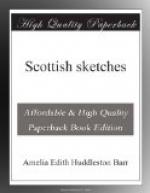That was a great thing for Andrew Cargill to say; Mysie hardly knew how to believe it. Such a confession was a kind of miracle, for she judged things by results and was not given to any consideration of the events that led up to them. She could not know, and did not suspect, that all the bitter truths she had spoken had been gradually forcing themselves on her husband’s mind. She did not know that wee Andrew’s happy face over his story-books, and his eager claim for sympathy, had been an accusation and a reproach which the old man had already humbly and sorrowfully accepted. Therefore his confession and his promise were a wonder to the woman, who had never before dared to admit that it was possible Andrew Cargill should do wrong in his own household.
CHAPTER II.
The confidence that came after this plain speaking was very sweet and comforting to both, although in their isolation and ignorance they knew not what steps to take in order to find Davie. Ten years had elapsed since he had hung for one heart-breaking moment on his mother’s neck, and bid, as he told her, a farewell for ever to the miserable scenes of his hard, bare childhood. Mysie had not been able to make herself believe that he was very wrong; dancing at pretty Mary Halliday’s bridal and singing two or three love-songs did not seem to the fond mother such awful transgressions as the stern, strict Covenanter really believed them to be, though even Mysie was willing to allow that Davie, in being beguiled into such sinful folly, “had made a sair tumble.”
However, Davie and his father had both said things that neither could win over, and the lad had gone proudly down the hill with but a few shillings in his pocket. Since then there had been ten years of anxious, longing grief that had remained unconfessed until this night. Now the hearts of both yearned for their lost son. But how should they find him? Andrew read nothing but his Bible and almanac; he had no conception of the world beyond Kendal and Keswick. He could scarcely imagine David going beyond these places, or, at any rate, the coast of Scotland. Should he make a pilgrimage round about all those parts?
Mysie shook her head. She thought Andrew had better go to Keswick and see the Methodist preacher there. She had heard they travelled all over the world, and if so, it was more than likely they had seen Davie Cargill; “at ony rate, he would gie advice worth speiring after.”
Andrew had but a light opinion of Methodists, and had never been inside the little chapel at Sinverness; but Mysie’s advice, he allowed, “had a savor o’ sense in it,” and so the next day he rode over to Keswick and opened his heart to John Sugden, the superintendent of the Derwent Circuit. He had assured himself on the road that he would only tell John just as much as was necessary for his quest; but he was quite unable to resist the preacher’s hearty sympathy. There never were two men more unlike than Andrew Cargill and John Sugden, and yet they loved each other at once.




